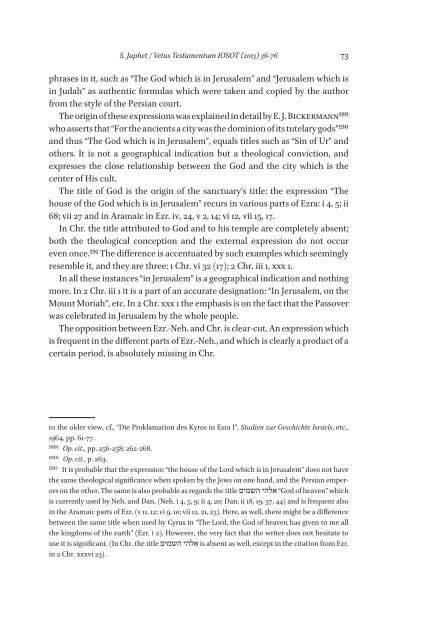Special Issue IOSOT 2013 - Books and Journals
Special Issue IOSOT 2013 - Books and Journals
Special Issue IOSOT 2013 - Books and Journals
You also want an ePaper? Increase the reach of your titles
YUMPU automatically turns print PDFs into web optimized ePapers that Google loves.
S. Japhet / Vetus Testamentum <strong>IOSOT</strong> (<strong>2013</strong>) 36-76 73<br />
phrases in it, such as “The God which is in Jerusalem” <strong>and</strong> “Jerusalem which is<br />
in Judah” as authentic formulas which were taken <strong>and</strong> copied by the author<br />
from the style of the Persian court.<br />
The origin of these expressions was explained in detail by E. J. Bickermann189<br />
who asserts that “For the ancients a city was the dominion of its tutelary gods”190<br />
<strong>and</strong> thus “The God which is in Jerusalem”, equals titles such as “Sin of Ur” <strong>and</strong><br />
others. It is not a geographical indication but a theological conviction, <strong>and</strong><br />
expresses the close relationship between the God <strong>and</strong> the city which is the<br />
center of His cult.<br />
The title of God is the origin of the sanctuary’s title: the expression “The<br />
house of the God which is in Jerusalem” recurs in various parts of Ezra: i 4, 5; ii<br />
68; vii 27 <strong>and</strong> in Aramaic in Ezr. iv, 24, v 2, 14; vi 12, vii 15, 17.<br />
In Chr. the title attributed to God <strong>and</strong> to his temple are completely absent;<br />
both the theological conception <strong>and</strong> the external expression do not occur<br />
even once.191 The difference is accentuated by such examples which seemingly<br />
resemble it, <strong>and</strong> they are three: 1 Chr. vi 32 (17); 2 Chr. iii 1, xxx 1.<br />
In all these instances “in Jerusalem” is a geographical indication <strong>and</strong> nothing<br />
more. In 2 Chr. iii 1 it is a part of an accurate designation: “In Jerusalem, on the<br />
Mount Moriah”, etc. In 2 Chr. xxx 1 the emphasis is on the fact that the Passover<br />
was celebrated in Jerusalem by the whole people.<br />
The opposition between Ezr.-Neh. <strong>and</strong> Chr. is clear-cut. An expression which<br />
is frequent in the different parts of Ezr.-Neh., <strong>and</strong> which is clearly a product of a<br />
certain period, is absolutely missing in Chr.<br />
to the older view, cf., “Die Proklamation des Kyros in Esra I”, Studien zur Geschichte Israels, etc.,<br />
1964, pp. 61-77.<br />
189) Op. cit., pp. 256-258; 262-268.<br />
190) Op. cit., p. 263.<br />
191) It is probable that the expression “the house of the Lord which is in Jerusalem” does not have<br />
the same theological significance when spoken by the Jews on one h<strong>and</strong>, <strong>and</strong> the Persian emperors<br />
on the other. The same is also probable as regards the title אלהי השמים “God of heaven” which<br />
is currently used by Neh. <strong>and</strong> Dan. (Neh. i 4, 5, 9; ii 4, 20; Dan. ii 18, 19, 37, 44) <strong>and</strong> is frequent also<br />
in the Aramaic parts of Ezr. (v 11, 12; vi 9, 10; vii 12, 21, 23). Here, as well, there might be a difference<br />
between the same title when used by Cyrus in “The Lord, the God of heaven has given to me all<br />
the kingdoms of the earth” (Ezr. i 2). However, the very fact that the writer does not hesitate to<br />
use it is significant. (In Chr. the title אלהי השמים is absent as well, except in the citation from Ezr.<br />
in 2 Chr. xxxvi 23).








![Am HaSefer [Volk des Buches] - Books and Journals](https://img.yumpu.com/20648352/1/174x260/am-hasefer-volk-des-buches-books-and-journals.jpg?quality=85)







